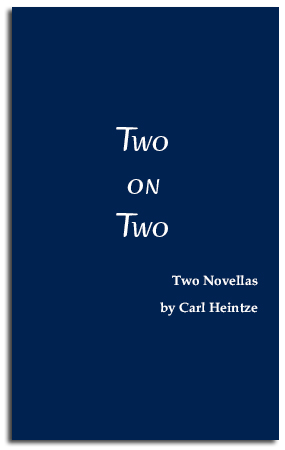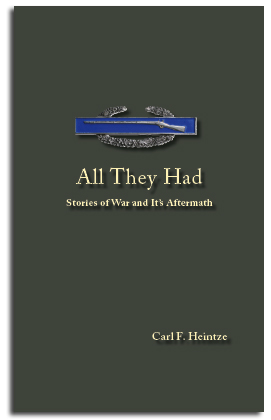-
|
Read a sample from:
"Going Home"
"Two on Two"
"Crush & Heat"
"An Island in the Turquoise Sea"
"All They Had"
|
|
Going Home
by Carl F. Heintze
198 pages
ISBN: 978-0-61170-138-8
Published by: Robertson Publishing (RP) |
The plane began its descent, braking slowing, its whine now a growl. Wilson Tanaka looked out the window waiting to see the familiar green mountains outlined against the afternoon sun, and the white surf curling at their base. He was certain they would appear, more certain than he was about anything else on this trip.
He was coming home, to the island where he had been born, but he was arriving not as a native, but as a stranger, years from his last visit, even more years from his beginning. He was coming home not because of nostalgia, but because of duty. His mother, to whom he wrote faithfully once a month, but whom he had not seen for almost three years, was dead.
The news had arrived by telephone at his home in California, in Los Altos, in the heart of Silicon Valley. It could not have come at a worse time. His marriage was dissolving, the device with which he was intimately connected was not working as it should and he did not know why. His life was coming apart and he did not know how to put it back together.
He knew all these things. He also knew he did not want to come home. He did not want to come back to where he had started, to be reminded of where he had begun or of what had happened to him—and what had not.
The plane passed over the harbor entrance, settling like some great bird on what seemed to be a field of weeds. Then magically the cement of the runway appeared, the wheels touched once, twice and a third and final time, the engines roared as they reversed, the brakes came on and they ground to a halt. At the end of the runway the plane turned into the taxiway and Wilson could see the terminal.
When the door opened the familiar breath of the island, humid and warm, rushed in to capture him. He pulled his bag down from the overhead rack and waited his turn to exit. |
Purchase "Going Home" from Ingram Books or from any of the links below: |
|
|
|
|

|
Two on Two
Two Novellas (Sunset. Uncertain.)
by Carl F. Heintze
326 pages
ISBN: 978-1-61170-070-1
Published by: Robertson Publishing (RP) |
|
Sunset:
The first time I saw Corbett Mercer I was less than impressed. He looked as if he had the weight of the world on his shoulders, as if he had lost his last friend as if he had had lemons for breakfast or maybe all three. To say that he was less than impressive would be an understatement. To say he radiated sex would be a gross injustice to males. He seemed absolutely neutral.
I don’t want you to think he was hostile or repugnant. I’d classify him as nice. He was, average in looks, he wore glasses when he read anything and he could never find his glasses when he needed to read, he had black hair turning toward hair and brown eyes, was—how shall I put it—pudgy, definitely pudgy, and he didn’t smile a lot.
His gray hair actually was an asset. Because it had started to appear at the sides of his head, not on top, he seemed distinguished, a kind of senior statesmen, somehow wise—as, indeed, he sometimes was.
And yet he also could appear, well, blah, a part of the office wall, something as neutral as the bookcase of legal volumes behind him and not very happy about his current case. I didn’t really even see him until Tom Collison, who was introducing me to people in the firm, said, “Corbett, this is Miriam Stern. She’s starting with us today.”
Corbett stood up and shook my hand, without getting around his desk—which was awkward, but not exactly unfriendly. But then Corbett usually is awkward, particularly when it would be graceful to be graceful. I suppose that’s one of his winning qualities. He’s a klutz and you tend to feel sorry for him, to want to help him, even though it turns out, he doesn’t really need help.
So that’s how I met Corbett Mercer about twenty years ago. He was a partner, I was an employee. I had passed the bar some time before. But I’d been hired as an employee. There’s a difference, not only in salary, but in prestige. I was beginning and Corbett was well along in his career.
There were some other differences. Corbett was happily—so far as I could tell—married and I was equally happily divorced. That was why I had come to work at Collison, Poleson, Grimes and Greenberg. I needed income to raise my three kids. I had a law degree. I had even practiced discreetly for awhile after I was married, but diapers and kindergarten and things like that had intervened.
Raising three children alone and working as a corporate lawyer takes a lot of time. I didn’t have space for much else in the years that followed my first day on the job. Nor, I guess, did Corbett. He also had three children, all of them approximately the same age as mine. I knew about them remotely, even as he knew about mine, because now and then we exchanged stories about our off-spring.
The only difference in our stories was that Corbett would occasionally mention his wife’s name. I didn’t want to talk about Paul. Corbett’s wife was named Maria and she was, I gradually came to realize, from San Francisco and she was Italian-American.
I don’t know that that should be surprising. California is, after all, a conglomerate of ethnicity and Italians had been a part of San Francisco since the Gold Rush. She was, I learned, also attractive, dark hair, red lips, tanned, mercurial, generous, opinionated, easy to love and just as easy to be difficult with. She could have considered herself Italian. But instead she thought of herself as a San Franciscan, she loved the fog and the views from the city’s various hills, she aspired to live atop one of them with a panoramic of the Bay and the bridges and she had achieved that.
And, you well may ask, what do I look like and what’s my story? Well, first of all, Jewish, dark hair, turning to gray, a long and narrow face, thin lips. How can I tell you what I looked like then or now? All I know about myself has been gathered from examining my face in a mirror. Egocentric that I am I do this at least once a day and sometimes more often.
From these many studies I think I look good. Maybe not beautiful, but not bad. Intelligent, perhaps, loving, certainly loving enough to attract Paul Smith as a husband, yes, I know, a gentile, but I’ve never been anything but Jewish. I grew up in a not very observant home, but lately I had been getting uneasy feelings around the Holidays, especially the Day of Atonement. My children were not raised in the faith or in any faith for that matter. They were just raised.... |
Purchase "Two on Two" from Ingram Books or from any of the links below: |
|
|
|

|
Crush & Heat
Two Stories of the Napa Valley
by Carl F. Heintze
212 pages
ISBN: 978-0-935125-86-0
Published by: Robertson Publishing (RP) |
|
Life and death are things newspapermen are supposed to deal with every day. Sometimes they do, but not very often, certainly not as often as most people think and then most of the time at second hand. But those outside the media think they do and that they have somehow become hardened to the beginning and end of life.
Actually the newspaper business is a lot like everything else in life, long periods of boredom interrupted by a few episodes of sheer excitement.
And like a lot of other things in this world the news business has changed over the years.
The days when newspapermen and women moved around the country from paper to paper disappeared when men stopped wearing hats. That’s certainly been true for me.
Most of my life and all my newspaper career has been spent in two places, Napa and San Jose, California. Napa was the town where I grew up and where I worked my first news job. San Jose is the place I’ve been ever since.
Since I left Napa, it’s become famous, or to be more precise the Napa Valley has become famous. Napa itself was first a small town and then a small city, but most of the action in the wine business has been up the valley beyond Napa itself.
That’s sort of been true of San Jose, too. When I first came to work in San Jose it was still a small city. Now it’s a big one. It likes to think of itself as an even bigger one, but it always lies somewhere in the shadow of San Francisco. So working on a newspaper in San Jose is at a level slightly beneath San Francisco. And it’s vague. Most people think of Silicon Valley as somewhere close to San Francisco, but it’s not quite there, it’s an ill-defined place, as ill-defined as is San Jose itself.
San Jose isn’t so much a city as a set of suburbs spread across the Santa Clara Valley from one range of mountains (the Diablo Range) to another (the Santa Cruz Mountains). It’s big, but it doesn’t have the character that San Francisco does. It does, however, have a lot of potential newspaper readers and I get some solace knowing that more and more people are reading what I write each day.
Still, writing for a newspaper is not the same as writing for the ages. Today’s paper, as an old printer once told me, is tomorrow’s fish wrapper. I don’t think many people wrap fish in newspaper any more, but you get what I mean. Newspaper prose is ephemeral and it seems that’s what my life has been... |
Purchase your copy of "Crush & Heat" from Ingram Books or any of the following: |
|
|
|
|

|
An Island in the Turquoise Sea
Stories of Kauai
by Carl F. Heintze
220 pages
ISBN: 978-0-935125-53-2
Published by: Robertson Publishing (RP) |
~Copyrighted Material~
Solstice
There are places in this world meant to be nowhere, places between then and tomorrow, places where it is always now. They are a solstice, as if, in them, time stopped at noon, leaving the sun and the wind unchanged, the clock still and not ticking, the air neither silent nor meaningful, but filled with unintelligible or unimportant sounds, a time when nothing moves, when the judgments of the past are suspended and the problems of the future have been postponed. There is only the present. Each breath, each glance each event is as timeless as the moment they are breathed, seen and perceived.
I came that way to Anini, seeking such a solistice, driving one afternoon in May in a rented car down the side road that forks from the main highway to Hanalei, down through the green of the trees to pause in a kind of dream where the road skirts the sea and the surf pouring in over the reef from the north. I had flown in from San Francisco, starting early that morning. My ears were still filled with the hum of the airplane’s engines. My mind was still emptied by the hours over endless white cloud and blue water.
It was the first time I had ever been to Kauai. I had come to it and to Anini because a friend had offered me his house there as a place of refuge. I thought there I might rid myself of the painful residue of a ten-year marriage that had ended suddenly and traumatically three months before.
I came because it seemed some vital part of me had been amputated, as if the stump that remained of that missing part of my persona was still bloody and unhealed. I needed not to think or remember. I needed only to breathe and look and be empty, to drink in the sea and the sun and the surf as if they were all in the world that mattered. Thus, when, at last, at the bottom of the hill I reached the ocean, I sat in the car on the edge of the road for a long time watching a brown skinned net fisherman as he walked the reef. He cast and then cast again. I could not see if he caught anything. For a long time he stood motionless studying the water before him, freezing everything as if it had been captured on a photographic slide. Then he gave up and left.
I put the car in gear and went on down the road behind the beach until I came to a house discreetly labeled “Forester.” The house was white with a blue aluminum roof and wide lanais in front and on either side. It was set up on piles above any vagrant tsunami waves and to allow cool air to blow beneath its floor. It belonged to my friend Nicholas Forester. It was where I was bound.
I parked the under the house, got my bag from the trunk and climbed the stairs to the front door. I put the key Nick had given me into the lock. The door opened easily and silently. I put my bag on a long low couch that faced toward the windows and the sea. Inside the house it was cool and pleasant. When I opened the shutters the trade wind entered in just enough strength to let me know it was there. I slid open the glass door and sat down beside my bag on the couch. The trees spread a green canopy almost all the way to the ocean...
|
|
Purchase An Island in the Turquoise Sea from Ingram Books or any of the following: |
|
|
|
|
|

|
All They Had
Stories of War and it's Aftermath
by Carl F. Heintze
181 pages
ISBN: 978-0-935125-03-7
Published by: Robertson Publishing (RP) |
|
~Copyrighted Material~
The Summerhouse |
The trucks begun to move at dusk, slowly at first and then with gathering speed, passing between the stark spiked shorn tree trunks, their branches and tops blown away by constant artillery, a land laid waste by war.
They were glad to be leaving it. Ravaged, gashed by shell fire, it was a monument to a battle just ended. In time it would to be called the Wood of the Dead for there were still unburied dead and thousands of mines beneath its wreckage.
Some of them had fought there. They remembered the wet and the cold, the gloom and the misery.
They had survived The Forest, but they had not yet escaped the war. Still in its grip this February night, they hunched forward on the wooden seats of the truck, Foster and his squad, as the convoy groped its way toward the paved road.
They rode silently jostling casually against one another.
They could have been any squad in any division, but they did not think of themselves that way. Instead they were one, a unity, the second squad of the second platoon and this was their home, their only home. When it moved, they moved, when it stopped they stopped. It was their only real identity.
They had camped in the middle of a battery of heavy artillery. As they pulled out the battalion’s guns groaned, their muzzle flashes lit the sky and blasts of sound crashed against their ears.
“Battery one round,“ someone said in the darkness. No one challenged this.
Then except for the truck motors it was silent.
No moon shone, but it was clear enough to see the stars. Although they did not know it, to the north and south hundreds of other units were moving, too, threading their way toward the Roer, still just below flood stage because of the broken dams upstream. The spring offensive had begun.
Foster thought of the stars for awhile, remembering that these same points of light shone above the home in California he had almost forgotten and on Kansas and Pennsylvania and Georgia and New York, the homes of his men.
His men!
For the first time he was in charge of the lives of others. For the first time he was a squad leader. According to the Table of Organization this should have meant he commanded eleven other men, but there were instead only eight. In their stay in the Forest the platoon had not been received enough replacements to raise its ranks to full strength. Instead of four men, he got only two, both just 18, Tracer and Brunning. He did not know much about them. Tracer was short, wore thick glasses, smiled nervously without saying much and had just graduated from high school. Brunning was a head taller and heavier and spoke with a Georgian drawl. He preceded most sentences with “Man.”
Foster did not know either of the new men’s first names. But he knew if he or they lasted long enough he might.
But this was not uppermost in his mind. Instead most of what he thought of was fear. As in every attack the future rushed at him like a dark glass, a murky window. It separated him from death. It was his vision, a vision he shared with no one. Beyond the glass were shapes he sometimes thought he could see, but they were never clear, never clearer than the fear of death. He thought of this and he thought of the terror that came with an attack, of pushing forward into the unknown, of expecting hostile fire, of feeling naked and alone, as if he were required to use his body and nothing else to drive the enemy backward. His stomach contracted.
Green, next to him, mumbled an obscene curse, although Foster knew Green did not view it as such. War was obscene in itself and obscene curses were a part of it. They were embedded in each day. No one heard them any more.
“Can it,” Foster said.
Green grumbled a few sentences more and then was silent... |
|
~Copyrighted Material~
Purchase All They Had from Ingram Books or any of the following: |
|
|
|
|
|
|
|
|
|
|
|